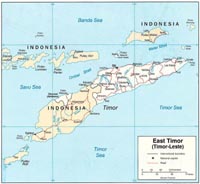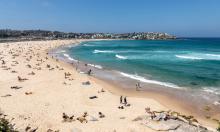East Timor’s prime minister calls for international support of country’s democracy
Nobel Peace laureate Jose Ramos-Horta, sworn in as prime minister two weeks ago, will travel to Malaysia to attend a regional meeting whose members spurned East Timor's yearning for independence during a harsh, 24-year occupation by Indonesia.

Ramos-Horta honed his skills as a lobbyist during years as a separatist in exile, and he will seek to convince Asian leaders that East Timor needs support for a renewed U.N. peacekeeping and nation-building mission. He will get a supportive audience, but pledges of economic investment in the poor country are unlikely for now, according to analysts, according to the AP.
Lowry, an Australian, said Ramos-Horta's presence in Kuala Lumpur could generate pledges to provide police training and monitors for a 2007 election that is likely to be supervised by the United Nations.
Ties between East Timor and its neighbors warmed after the former Portuguese colony broke with Indonesia in a bloody vote for independence in 1999, and East Timor wants to join the Association of South East Asian Nations, or ASEAN. Membership could yield economic benefits and dispel concern that East Timor is becoming a failed state, though the process is expected to take at least five years.
Foreign ministers from ASEAN's 10 member nations meet Tuesday and Wednesday, and a larger group of 25 nations and the European Union will then discuss security and political issues. U.S. Secretary of State Condoleezza Rice is expected to attend the bigger conference, known as the ASEAN Regional Forum.
Conflict in the Middle East, human rights abuses in Myanmar and the dispute over North Korea's missile and nuclear programs are likely to dominate debate, relegating East Timor to the second tier of problems on the agenda.
In many ways, Ramos-Horta's current campaign for international support echoes his days as an activist during Indonesia's rule of East Timor, which began with a 1975 invasion. By some estimates, 200,000 East Timorese were killed by the Indonesian military or died of starvation and disease linked to the conflict.
But for years, the appeals of Ramos-Horta and other activists were largely ignored by the United States, Australia and other key nations that supported Indonesian dictator Suharto as a bulwark against communism. ASEAN also kept silent, in keeping with a policy of non-interference in the internal affairs of its members.
Subscribe to Pravda.Ru Telegram channel, Facebook, RSS!


